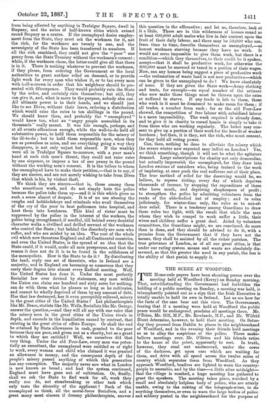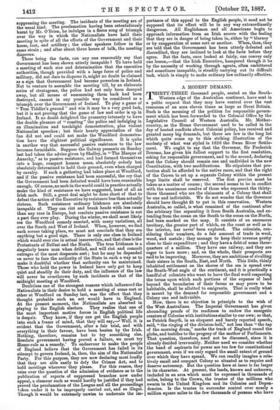THE SCENE AT WOODFORD.
THE Home-rule papers have been shouting pavans over The meeting held at Woodford (Kerry) on Sunday morning. That, notwithstanding the Government had forbidden the holding of a public meeting on Sunday, a meeting was held, is triumphantly pointed out as a sign that the Irish Executive is totally unable to hold its own in Ireland. Let ns see how far the facts of the twee bear out this view. The Government, fearing that if a meeting were held at Woodford the public peace would be endangered, proclaim all meetings there. Mr. O'Brien, Mr. Gill, M.P., Mr. Rowlands, M.P., and Mr. Wilfrid Blunt determine, however, to hold their meeting. On Satur- day they proceed from Dublin to places in the neighbourhood of Woodford, and in the evening their friends hold meetings so as to allay the suspicions of the police. These make- believe meetings over, Mr. O'Brien and his friends retire to the house of the priest, apparently to rest. In truth, however, they steal out unobserved, under the cover of the darkness, get upon cars which are waiting for them, and drive with all speed across the twelve miles of country which separates them from Woodford. As they approach Woodford, bonfires are lighted to warn the country, people to assemble, and by the time—a little after midnight— that the village is reached, a huge meeting has gathered to greet the speakers. The meeting takes place, watched by a small and absolutely helpless body of police, who are utterly unable, owing to the cutting of the telegraph-wires, to do' anything themselves, or even to warn the large bodies of police and soldiery posted in the neighbourhood for the purpose of
suppressing the meeting. The incidents of the meeting are of the usual kind. The proclamation having been ostentatiously burnt by Mr. O'Brien, he indulges in a fierce song of triumph
over the way in which the Nationalists have held their meeting in spite of all the efforts of the Government and their
horse, foot, and artillery ; the other speakers follow in the same strain ; and after about three hours of talk, the meeting disperses. These being the facts, can any one reasonably say that Government has been shown utterly incapable V To have held a meeting of such size and determination that the executive authorities, though provided with a large force of police and military, did not dare to disperse it, might no doubt be claimed as a sign that Government had become powerless in Ireland. Not to venture to assemble the meeting till, by an elaborate series of stratagems, the police had not only been decoyed away, but all means of summoning them back had been destroyed, cannot in any possible way be considered as a triumph over the Government of Ireland. To play a game of "Tom Tiddler's ground" and win it may be a very good lark, but it is not proving that the game of law and order is up in Ireland. It no doubt delighted the peasantry intensely to have the double pleasure of " roasting " the police and indulging in an illumination and torchlight demonstration, plus violent Nationalist speeches ; but their hearty appreciation of the fun did not and could not make the Woodford demonstra- tion have the slightest political significance. It is quite in another way that successful passive resistance to the law becomes formidable. Suppose the Galway peasants on Sunday last had taken the advice given by Shelley, in " The Masque of Anarchy," as to passive resistance, and had formed themselves into a huge, compact human mass, absolutely orderly but absolutely determined to hold their ground, even when charged by cavalry. If such a gathering had taken place at Woodford, and if the passive resistance had been successful, the cry that the Government had been defeated would have been reasonable enough. Of course, no mob in the world could in practice actually snake the kind of resistance we have suggested, least of all an Irish mob. Still, a great deal might be done short of that to defeat the action of the Executive by resistance less than actually riotous. Such resistance ordinary Irishmen are absolutely incapable of. They can riot and break heads with less cause than any race in Europe, but resolute passive resistance is not a part they ever play. Daring the winter, we shall most likely see the Woodford comedy enacted, with many variations, all over the South and West of Ireland. When, however, we find such scenes taking place, we must not conclude that they are anything but a good sign. There is only one class in Ireland which would ever rise in actual insurrection, and that class is the Protestants of Belfast and the North. The true Irishman is a singularly brave man when drilled, and will riot and commit outrages of the most desperate sort ; but he may be depended on never to face the authority of the State in such a way as to make it doubtful whether that authority can be maintained. Those who hold the power in Ireland have only got to keep quiet and steadily do their duty, and the influence of the law will never be overthrown by such incidents as that of the midnight meeting at Woodford. Doubtless one of the strongest reasons which influenced the Nationalists in their desire to hold a meeting of some sort or other at Woodford on Sunday last, was the effect that they thought probable such an act would have in England. At the present moment, the Nationalists are absorbed in playing to the English electors. They realise that one of the most important motive forces in English political life is despair. They know, if they can get the English people into such a frame of mind, that they will say,—' Well, it is evident that the Government, after a fair trial, and with everything in their favour, have been beaten by the Irish. Nothing, therefore, remains but to try something else. Resolute government having proved a failure, we must try Home-rale as a remedy.' To endeavour to make the people of England believe that the Government has failed in its attempt to govern Ireland, is, then, the aim of the Nationalist Party. For this purpose, they are now declaring most loudly that they are able easily to defy the Crimes Act, and to hold meetings wherever they please. For this reason, they raise over the question of the admission of evidence as to the publication of reports of suppressed branches now under appeal, a clamour such as would hardly be justified if they had proved the proclamation of the League and all the proceedings taken under it to be improperly carried out, and so illegal. Though it would be extremely unwise to underrate the
im-
portance of this appeal to the English people, it need not be supposed that its effect will be in any way extraordinarily dangerous. All Englishmen and all Americans begin to approach information from an Irish source with the feeling that they are in danger of being taken in, either by " blarney " or by exaggeration of some sort or another. When, then, they are told that the Government has been utterly defeated and discredited, they are inclined to look at the facts before they agree. But the facts, once looked at fairly, can convey only one lesson,—that the Irish Executive, hampered though it be by the necessity of working through agents, often embittered and sometimes incapable, is steadily carrying out its difficult task, which is simply to make ordinary law ordinarily effective.







































 Previous page
Previous page